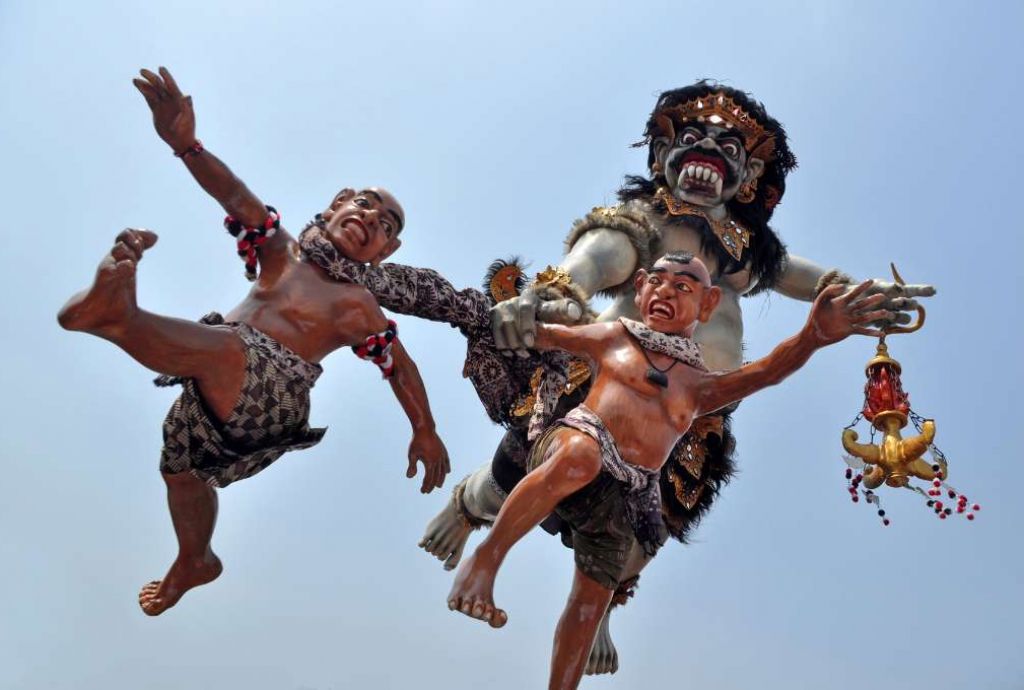
Complete Guide to Nyepi

All You Need to Know About Nyepi: The Hindu Day of Silence
Nyepi, also known as the Day of Silence, is the most significant and sacred day in the Balinese Hindu calendar. It is a day of self-reflection and meditation, where people on the island of Bali in Indonesia observe complete silence, fasting, and abstinence. In this article, we will delve into the history, events, and preparations needed for Nyepi, as well as what non-Hindunese visitors should keep in mind.
History of Nyepi
Nyepi has been celebrated in Bali for centuries and has its roots in Hindu mythology. It falls on the day following the new moon of the Balinese Saka calendar, which signals the new year of the Saka calendar. It usually occurs in March or April and is a day of complete silence, where all activity on the island is put to a halt.
According to legend, the demons of the island were driven away during the day before Nyepi, known as Pengrupukan, through loud noises and the burning of effigies. On the day of Nyepi itself, the island is thought to be deserted, so that the demons would think it uninhabited and move on.
Alt text: Leak Bali
Source: https://bit.ly/3F2JBVN
The historical record suggests that Nyepi was created based on a story from the Vedic scriptures that tells how, in the early centuries AD, the State of India and its surrounding areas were described as always experiencing prolonged social crises and conflicts. At that time, there were many conflicts between tribes (Caka, Pahiava, Yueh Chi, Yavana, and Malaya) with alternating winning and losing conditions.
The waves of inter-tribal power struggles eventually caused religious life to drift. In the end, the Caka tribe became the winner under the leadership of King Kaniskha I, who was crowned King and descended from Caka on the first day (one day after tilem) of the first month (caitramasa) of the year 01 Caka, in March 78 AD. To commemorate the good things that happened under the leadership of King Kaniskha I, the Holy Day of Nyepi was created. Since then, the life of the state, society, and religion in India has been reorganized.
Series of Events of Nyepi
Nyepi is actually a series of events that take place over a period of a few days. Here's a breakdown of each day:
Melasti
Melasti is the first event of Nyepi and takes place three days prior. This event is a purification ceremony that involves taking temple artefacts to the sea or lake to be cleansed. For Balinese Hindus, the sea and the lake are the source of sacred water of life (tirta amerta) which is believed can cleanse all kinds of dirt in humans and the universe.
Alt text: Melasti ceremony
Source: https://upload.wikimedia.org/wikipedia/commons/f/fd/ST_5670.jpg
Legian, Canggu, and Melasti Beaches are well-known locations for the Melasti ceremony. If you want to experience the ceremony up close, make sure to respect the event and observe proper manners.
Mecaru and Pengrupukan
The second event is Pengrupukan, also known as Mecaru. This is the day before Nyepi and involves the burning of effigies (ogoh-ogoh) that represent evil spirits (bhuta kala), with the aim of driving them away by making loud noises.
Alt text: Ogoh ogoh
Source: https://www.flickr.com/photos/janumedia/427709947
Nyepi
Nyepi itself is the third event and is the day of silence, where the entire island shuts down. No lights are allowed, no fires can be lit, no one is allowed to work, and no one can leave their homes. This is a time for self-reflection and to purify oneself. There are four restrictions, also called Catur Brata Penyepian, which include:
Amati Geni: It is forbidden to turn on the fire both literally and figuratively. In addition to prohibiting the lighting of fires or lamps, Hindus are asked to temper their passions, emotions, and anger.
Amati Karya: No work. Nyepi is a moment to take a break from all the hustle and bustle of work and an invitation to pause and reflect on what an individual has done so far.
Amati Lelanguan: It is forbidden to seek or create entertainment, ranging from partying, gambling, and so on that are considered entertaining. That's why the internet, radio and local TV are also turned off for the day in Bali.
Amati Lelungan: Travel is prohibited, no one is given access to travel except authorized personnel such as police, firefighters, hospitals, and other relevant agencies. So the streets in Bali will be very quiet.
Alt text: Nyepi Day
Source: https://commons.wikimedia.org/wiki/File:Nyepi2012.jpg
Ngembak Geni
The final event of the Balinese New Year celebration is Ngembak Geni, which is held one day after Nyepi. This is a special time when forgiveness is sought and granted among family and friends. Balinese people take this opportunity to visit one another, exchange greetings, and ask for forgiveness for any wrongdoings committed during the past year.
Alt text: Family visit after Nyepi
Source: https://commons.wikimedia.org/wiki/File:Galungan.jpg
What non-Hindunese need to prepare during Nyepi
If you're planning to visit Bali during Nyepi, it's important to be aware of the restrictions in place and prepare accordingly. Here are some things to keep in mind:
1. No internet
During Nyepi, the local mobile internet provider will shut its signal in Bali areas. If you’re worried about your work then fear not, you can still access the wifi. But for a quiet moment as rare as Nyepi in Bali, it’d be a waste just to pass it by on Netflix or games. Instead, you can use this time to disconnect from the world and focus on self-reflection.
2. Stock up on food
All shops and restaurants will be closed during Nyepi, so it's important to stock up on food beforehand. While some hotels and resorts may have limited menus available, it's best to be prepared with snacks and other essentials. And according to past events, it is highly advisable to not buy your groceries one or two days before Nyepi, unless you enjoy a long queue, a massive crowd in the store, or running out of stock.
Alt text: Crowded store before Nyepi
Source: https://www.flickr.com/photos/hawaii/262611843
3. No noise
During Nyepi, there is a complete ban on noise. Loud music and talking loudly are not allowed, and it's important to be respectful of this. Embrace the silence and take the time to reflect on your life and goals.
4. All facilities are closed, except for hospitals
During Nyepi, all public and commercial facilities, including offices, airports, shops, restaurants, and even ATMs are closed. This is to maintain the solemnity of the event. It's worth noting that Ngurah Rai International Airport is the only airport in the world that shuts down for 24 hours during Nyepi. Despite the closures, the Balinese government still accommodates other religious communities during this time. For example, when Nyepi coincides with Friday prayers for Muslims, they are allowed to pray together in mosques, only without loudspeakers. After prayer, they are expected to return home and observe the rest of Nyepi in silence.
Fascinating Facts About Nyepi
Stargazing on Nyepi Night
One of the most enchanting experiences during Nyepi is the clear and starry night sky. Since the island is devoid of all artificial lights, you can observe the twinkling stars and the Milky Way in all its glory. It's the perfect time to lay back and marvel at the beauty of the cosmos. So prepare your best gear to capture the rare moments or simply lay out your mat on the rooftop to enjoy the glory of the Balinese night sky.
Alt text: Nyepi milky way
Source: https://www.flickr.com/photos/36760290@N08/40834625052
Omed-omedan Festival in Sesetan, Denpasar
Omed-omedan is a lively ceremony that takes place in Sesetan village every year, after Nyepi day, on Ngembak Geni day to welcome the new Saka year. It's a tradition that has been carried out for generations by the youth of Banjar Kaja. Omed-omedan, which means 'pull and pull' in Balinese, involves unmarried youths between the ages of 17 to 30. The highlight of this ceremony is when male and female groups pull each other with bare hands, hug, and even kiss while being splashed with water. This unique ceremony is held until 5 PM local time and is a must-see spectacle.
Alt text: Kiss festival after Nyepi
Source: https://bit.ly/3IV5TKv
Mebuug-Buugan Mud Tradition
Another quirky tradition during Nyepi is the Mebuug-Buugan mud festival, which is practiced in Kedonganan Traditional Village, Kuta District, Badung Regency. The word 'buug' means soil or mud, and the purpose of this tradition is to cleanse oneself to welcome the new year. Participants of all ages, both men and women, get dirty with mud and engage in a playful mud war. Afterward, they walk to the beach in the west to clean themselves. The Mebuug-Buugan tradition dates back hundreds of years, and after being discontinued for 60 years, it was revived in 2015.
Nyepi is a remarkable and significant holiday in Bali that is steeped in rich traditions and symbolism. For visitors who are not Hindu, it's important to acknowledge and honor the restrictions during this period and respect the customs and traditions of the island. By doing so, visitors can experience the wonder of Nyepi and gain a deeper appreciation of Balinese culture
Topic Categories
- All 280
- Uncategorized 6
- Bali Villa 20
- Bali Politics 6
- Bali News Update 7
- Bali Shopping 3
- Bali Tourism 34
- Bali Spirituality 2
- Bali Beauty and Fashion 0
- Bali History and Culture 23
- Bali Property Appraisal 1
- Bali Property Financing 3
- Bali Property Insurance 1
- Bali Property Management 5
- Bali Environment 10
- Bali Pets 2
- Bali Health and Wellness 6
- Invest in Bali 20
- Bali Local Services 5
- Bali Food & Dining 8
- Bali Home Improvement & Design 6
- Bali Legal Tips 7
- Bali Neighborhood Guides 11
- Bali Property Market Trends 13
- Bali Property Advice 56
- Bali Attractions 12
- FAQ 2
- Living in Bali 29
Topic Tags
- All 280
- Uncategorized 36
- Bali market report 1
- Villa for sale Canggu 4
- Villa for sale Uluwatu 4
- Bali Rentals 1
- Buying Process 6
- Labuan Bajo 0
- Bali Hospital 3
- Bali School 3
- Bali Beach 7
- Co-working Space 3
- Petitenget 1
- Australia 0
- China 2
- Bali Wedding 1
- Bali Flights 4
- Retire in Bali 4
- Nyepi 2
- Bali Villa Sale 18
- Bali Visa 4
- Bali Travel 23
- Villa Rental 7
- Airbnb 0
- PT PMA 3
- Bali Zoning Law 1
- Bali Tax 3
- Bali Property 50
- Double Six 0
- Sunset Road 0
- Nyanyi 1
- Legian 1
- Beach Club 4
- Oberoi 0
- Batu Bolong 3
- Batu Belig 0
- Business 2
- Legal 10
- Investment 31
- Tourism 44
- Travel 12
- Jimbaran 4
- Denpasar 2
- Seseh 2
- Eid al Adha 1
- Ascension Day 0
- Easter 0
- Vesak 0
- Islamic New Year 0
- Eid al-Fitr 1
- International Labor Day 0
- Independence Day 2
- Day of Silence 0
- Galungan Day 1
- Valentine 2
- Christmas 4
- New Year 4
- Lunar New Year 2
- Bali Market Trends 12
- Bali Art & Culture 18
- Bali Home Design 9
- Bali Health & Wellness 6
- Bali Food and Dining 10
- Bali Pets 3
- Bali Lifestyle 25
- Rice Field Front 1
- Jungle View 1
- River Front 0
- Rice Field View 3
- Ocean View 4
- Private Pool 0
- Fix and Flip 1
- Fixer-Upper 0
- Hotel & Resort 1
- Guest House 0
- Street Front 0
- Residential Zone 0
- Touristic Zoning 0
- Freehold 4
- Long Lease 7
- Short-Term 1
- Minimalist Villa 0
- Luxury Villa 7
- Turnkey Villa 3
- Residential Complex 0
- Exclusive Listing 0
- Off-Plan Property 4
- Studio 0
- Loft 0
- Apartment 8
- Villa 15
- Land 6
- Beachfront 3
- Family Villa 0
- Retirement Villa 1
- Investment Villa 22
- Digital Nomad 0
- Commercial Property 3
- Eco-friendly 0
- Contemporary Style 0
- Modern Style 1
- Javanese Style 0
- Rustic Style 0
- Traditional Style 0
- Bohemian Style 0
- Mediterranean Style 1
- Balinese style 1
- Nusa Penida 1
- Lombok 2
- Gili Island 3
- Amed 0
- Tabanan 1
- Cemagi 4
- Nusa Dua 6
- Sanur 4
- Umalas 4
- Berawa 5
- Ubud 3
- Tanah Lot 1
- Kuta 4
- Pererenan 5
- Uluwatu/Bukit Peninsula 15
- Seminyak 5
- Canggu 25
Relevant Articles you may like
About Bali Home Immo
Established in 2009, Bali Home Immo is the first real estate agency in Canggu with more than 7000 Bali properties listed in its database. Bali Home Immo (PT. Bali Properti Kontruksi) is a licensed property agency (SIUP-P4 certified) located in Bali, Indonesia and have been successfully operating as a trustworthy and reputable real estate agency with more than 13 years of experience. Long-standing partnerships and a committed, dedicated team are the driving force behind the work that takes place every day at Bali Home Immo.
As a member of the Real Estate Broker Association of Indonesia (AREBI), Bali Home Immo Property offers luxury real estate across the region to a local and international client base. Catering to a wide range of property requests, the team will ensure they can find a property, land or residential listing, to match each client’s personal requirements.
We have curated a wide selection of properties ranging from the land for sale, villas for sale and rent, as well as commercial space rental in Bali's most in-demand areas including Canggu, Seminyak, Pererenan, Umalas, and Uluwatu. Not only Bali, but our connection also reaches other popular destinations in Indonesia including Gili Islands, Lombok, Labuan Bajo, and more.
We also provide professional marketing services that will showcase the best of your Bali properties to more than +160k social media followers and maximise the potential to find buyers looking at villas for sale in Bali. With a thorough knowledge of the Bali property market inside-out, we deliver the most professional and data-driven valuation of your property at the most competitive price for your Bali properties.
Our expertise in the local market and extensive network affiliated with 93 local and international partners including Goplaceit.com, Rumah123, Kangaloo, Luxury Estate, and many more will also help you bring global exposure to your real estate investment and find your dream Bali property. Looking to buy villas for sale in Bali? Check out our online catalogue of Bali real estate and follow us on social media for updates.
Map
Send an Enquiry
Property Search
Sell/Rent My Property
Please fill this form and our listing agents will contact you to visit your property and/or give you a price valuation




